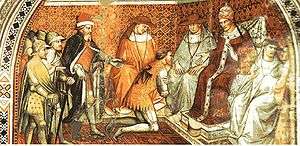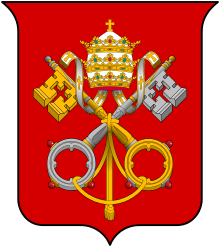Pope Alexander III
| Pope Alexander III | |
|---|---|
|
Alexander III with Barbarossa and his wife | |
| Papacy began | 7 September 1159 |
| Papacy ended | 30 August 1181 |
| Predecessor | Adrian IV |
| Successor | Lucius III |
| Orders | |
| Consecration |
20 September 1159 by Ubaldo Allucingoli |
| Created Cardinal |
October 1150 by Eugene III |
| Personal details | |
| Birth name | Roland of Siena |
| Born |
c. 1100–05 Siena, Holy Roman Empire |
| Died |
30 August 1181 Civita Castellana, Papal States, Holy Roman Empire |
| Previous post |
|
| Other popes named Alexander | |
| Papal styles of Pope Alexander III | |
|---|---|
 | |
| Reference style | His Holiness |
| Spoken style | Your Holiness |
| Religious style | Holy Father |
| Posthumous style | none |
Pope Alexander III (c. 1100/1105 – 30 August 1181), born Roland of Siena,[1] was Pope from 7 September 1159 to his death in 1181.
Through the Papal bull Manifestis Probatum, issued on 23 May 1179, he recognized the right of Afonso I to proclaim himself King of Portugal, thus recognizing Portugal as an independent and sovereign Kingdom.[2] He also laid the foundation stone for the Notre-Dame de Paris.
Early life and career
Pope Alexander III was born in Siena. From 14th century he is referred to as a member of the aristocratic family of Bandinelli, although this has not been proven.[3] Long thought to be the 12th-century canon lawyer and theologian Master Roland of Bologna, who composed the "Stroma" or "Summa Rolandi"—one of the earliest commentaries on the Decretum of Gratian—and the "Sententiae Rolandi", a sentence collection displaying the influence of Pierre Abélard, John T. Noonan and Rudolf Weigand have shown this to be another Rolandus.[4][5]
He probably studied at Bologna, where Robert of Torigni notes that he taught theology.[6] In October 1150, Pope Eugene III created him Cardinal-Deacon of Santi Cosma e Damiano. Later he became Cardinal-Priest of St Mark.[7] In 1153, he became papal chancellor and was the leader of the cardinals opposed to German Emperor Frederick I Barbarossa. He negotiated the Treaty of Benevento, which restored peaceful relations between Rome and the Kingdom of Sicily.
Disputed election
On 7 September 1159, he was chosen the successor of Pope Adrian IV. A minority of the cardinals, however, elected the cardinal priest Octavian, who assumed the name of Victor IV and became the German Emperor's antipope. The situation was critical for Alexander III, because according to many chronicles of the time (perhaps exaggerating), Barbarossa's antipope received the approval of most of the kingdoms of Europe, with the exception of the kingdoms of Portugal, Sicily and Spain. However, in 1161, King Géza II of Hungary signed an agreement and recognised Alexander III as the rightful pope and declared that the supreme spiritual leader was the only one who could exercise the rite of investiture.[8] This meant that Alexander's legitimacy was gaining strength, as soon proved by the fact that other monarchs, such as the king of France and King Henry II of England, recognized his authority. Because of imperial strength in Italy, Alexander was forced to reside outside of Rome for a large part of his pontificate.[6]
However, the dispute between Alexander III, Antipope Victor IV and his successors Antipope Paschal III and Antipope Calixtus III (who had the German imperial support) continued until Frederick Barbarossa's defeat at the Legnano in 1176, after which Barbarossa finally (in the Peace of Venice of 1177) recognized Alexander III as pope.[7] On 12 March 1178, Alexander III returned to Rome, which he had been compelled to leave twice: the first time between 1162 and 23 November 1165, when he was sent into exile in Campania by Oddone Frangipane following his brief arrest and detainment, and again in 1167. The first period he spent in France, the latter chiefly in Gaeta, Benevento, Anagni, and Venice.
Alexander's politics

Alexander III was the first pope known to have paid direct attention to missionary activities east of the Baltic Sea. He had created the Archbishopric of Uppsala in Sweden in 1164[9] probably at the suggestion of his close friend Eskil, Archbishop of Lund - exiled in Clairvaux, France, due to a conflict with the Danish king. The latter appointed a Benedictine monk Fulco as a bishop in Estonia. In 1171, Alexander became the first pope to address the situation of the Church in Finland, with Finns allegedly harassing priests and only relying on God in time of war.[10]
Besides checkmating Barbarossa, Alexander humbled King Henry II of England for the murder of Thomas Becket in 1170, to whom he was unusually close, later canonizing Becket in 1173.[11][12] This was the second English saint canonized by Alexander, the first being Edward the Confessor in 1161.[11] Nonetheless, he confirmed the position of Henry as Lord of Ireland in 1172.
Through the Papal bull Manifestis Probatum, issued on 23 May 1179, he also recognized the right of Afonso I to proclaim himself King of Portugal – an important step in the process of Portugal becoming a recognized independent Kingdom (Afonso had been using the title of King since 1139).[2]
Efforts at reform
Even as a fugitive, Alexander enjoyed the favour and protection of Louis VII of France.
In 1163 Alexander summoned clergy and prelates from England, France, Italy, and Spain to the Council of Tours to address, among other things, the unlawful division of ecclesiastical benefices, clerical usury, and lay possession of tithes.[6]
In March 1179, Alexander III held the Third Council of the Lateran, one of the most important mediaeval church councils, reckoned by the Catholic Church as the eleventh ecumenical council. Its acts embodied several of the Pope's proposals for the betterment of the condition of the Church, among them the law requiring that no one could be elected pope without the votes of two-thirds of the cardinals.[13] The rule was altered slightly in 1996, but was restored in 2007. This synod marked the summit of Alexander III's power.
Nevertheless, soon after the close of the synod, the Roman Republic forced Alexander III to leave the city, which he never re-entered, and on 29 September 1179, some nobles set up the Antipope Innocent III. By the judicious use of money, however, Alexander III got him into his power, so that he was deposed in January 1180. In 1181, Alexander III excommunicated King William I of Scotland and put the kingdom under an interdict.[14]
He died at Civita Castellana on 30 August 1181.
Notes
- ↑ In Italian Rolando or Orlando.
- 1 2 Peter Linehan and Janet Laughland Nelson, The Medieval World, Vol.10, (Routledge, 2001), 524.
- ↑ Maleczek, W. (1984). Papst und Kardinalskolleg von 1191 bis 1216 (in German). Wien. p. 233 note 168. ISBN 3-7001-0660-2.
- ↑ See Noonan, John T. (1977). "Who was Rolandus?". In Pennington, Kenneth; Somerville, Robert. Law, Church, and Society: Essays in Honor of Stephan Kuttner. Philadelphia: University of Pennsylvania Press. pp. 21–48. ISBN 0-8122-7726-0.
- ↑ Weigand, Rudolph (1980). "Magister Rolandus und Papst Alexander III". Archiv für katholisches Kirchenrecht. 149: 3–44. Reprinted in idem, Glossatoren des Dekrets Gratians [Goldbach: Keip, 1997], pp. 73*–114* , ISBN 3-8051-0272-0.
- 1 2 3 Pennington, Kenneth. "Pope Alexander III", The Great Popes through History: An Encyclopedia, (Frank J. Coppa, ed.), Westport: Greenwood Press, (2002) 1.113-122
- 1 2 Loughlin, James. "Pope Alexander III." The Catholic Encyclopedia Vol. 1. New York: Robert Appleton Company, 1907. 27 Jul. 2015
- ↑ Bodri Ferenc: Lukács érsek és kora. Kossuth, 2003
- ↑ Papal Letters to Scandinavia and their Preservation, Anders Winroth, Charters, Cartularies and Archives: The Preservation and Transmission of Documents in the Medieval West, ed. Adam J. Kosto and Anders Winroth, (Pontifical Institute of Mediaeval Studies, 2002), 178.
- ↑ "Letter by Pope Alexander III to the Archbishop of Uppsala". Archived from the original on 2007-09-27.. In Latin. Hosted by the National Archive of Finland. See and Diplomatarium Fennicum from the menu.
- 1 2 Norton, Christopher (2006). St. William of York. Rochester, NY: Boydell Press. p. 193. ISBN 1-903153-17-4.
- ↑ St. Thomas Becket. Biography.com. Retrieved: 21 March 2013.
- ↑ Joseph F. Kelly, The Ecumenical Councils of the Catholic Church: A History, (Liturgical Press, 2009), 83.
- ↑ Philip J. Potter, Gothic Kings of Britain: The Lives of 31 Medieval Rulers, 1016-1399, (McFarland & Company, Inc., 2009), 148.
References
| Wikisource has original works written by or about: Alexander III |
-
 Herbermann, Charles, ed. (1913). "Pope Alexander III". Catholic Encyclopedia. New York: Robert Appleton Company.
Herbermann, Charles, ed. (1913). "Pope Alexander III". Catholic Encyclopedia. New York: Robert Appleton Company. -
 This article incorporates text from a publication now in the public domain: Chisholm, Hugh, ed. (1911). "Alexander (popes)". Encyclopædia Britannica (11th ed.). Cambridge University Press.
This article incorporates text from a publication now in the public domain: Chisholm, Hugh, ed. (1911). "Alexander (popes)". Encyclopædia Britannica (11th ed.). Cambridge University Press. - Myriam Soria Audebert, "Pontifical Propaganda during the Schisms: Alexander III to the reconquest of Church Unity," in Convaincre et persuader: Communication et propagande aux XII et XIIIe siècles. Ed. par Martin Aurell. Poitiers: Université de Poitiers-centre d'études supérieures de civilisation médiévale, 2007,
| Catholic Church titles | ||
|---|---|---|
| Preceded by Adrian IV |
Pope 1159–81 |
Succeeded by Lucius III |

